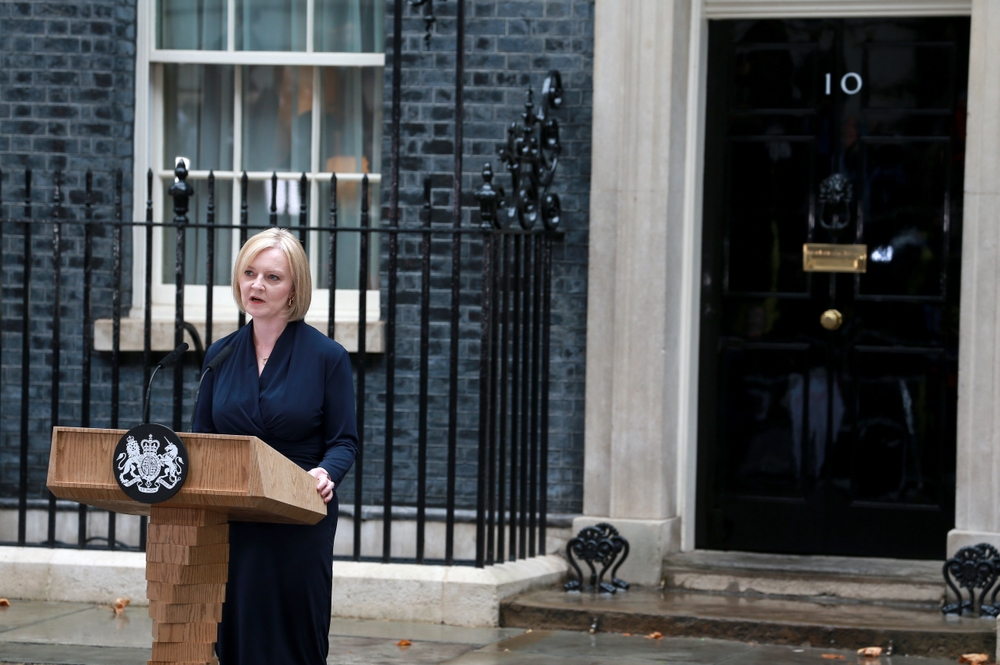Fri Oct 21, 2022
Hard Times in England
Yesterday, the UK markets officially had a cold shower due to the shock resignation. Prime Minister Liz Truss, who has recently become the target of criticism about economic policies, announced her resignation with a snap decision the day we left behind. Thus, Truss, who remained in office for 44 days, became the shortest-tenure prime minister in British history.
Speaking at the press conference she held at the Prime Minister's Residence called 10 Downing Street, Truss reminded that she has come for economic change since she took office on September 6 and stated that they have put forward a vision of an economy with a low tax system. Continuing her speech by declaring that she will continue her duty until the new Prime Minister is elected, Truss expressed her thanks and submitted her resignation to King Charles III.
After the entertainment events that former Prime Minister Boris Johnson attended during the quarantine period of the coronavirus pandemic, the reactions on the opposition wing lasted for a long time and he was forced to resign. On July 7, Johnson, unable to withstand the pressure, resigned.
Subsequently, Conservative party leaders officially launched the race for the position of Prime Minister in the country. While 8 candidates shared their trump card for the new Prime Minister's candidacy on 12 July, Foreign Minister Liz Truss and former Finance Minister Rushi Sunak eliminated their opponents at the end of 5 rounds of voting within the Conservative party.
Of the 172 thousand 438 Conservative Party members, Truss received 56.3% of the votes with 81 thousand 326 votes, while former Finance Minister Rushi Sunak received 43.7% of the votes with 60 thousand 399 votes. Thus, 47-year-old Liz Truss became Britain's third female prime minister, after Margaret Thatcher and Theresa May.
Truss, who prioritized the low-tax economic policy and growth rather than the fight against inflation after she took office, rejected the criticisms that this policy would further fuel inflation, which had already reached its highest level in 40 years, while arguing that it would relieve the suffocating economy, on the contrary, by increasing the purchasing power. However, her position as Prime Minister has been quite turbulent for Truss since she took office. Truss, who amended the Cabinet after taking office, appointed many new ministers. Foremost among these changes was the New Finance Minister, Kwasi Kwarteng.
On September 28, Minister Kwasi announced a mini-budget of 45 billion pounds, the biggest tax cut package in the last 50 years. According to the announced budget, the 45% special tax bracket taken from high-income people would be completely abolished; simple tax revenues would be reduced from 20% to 19%, and tax increases planned to be implemented in 2023 would be canceled.
After the government announced the budget package in question, the pound officially melted against the US dollar, so to speak, on concerns that the country's external borrowing would rise and increase inflation. The pound, which saw its historical low at 1.0356, could not show a permanent recovery for a while.
After these, the government became the target of criticism arrows, especially from the Opposition wing. With the reactions, Prime Minister Liz Truss announced that she dismissed Minister Kwasi Kwasteng on the 38th day of his duty and replaced him with former Foreign Minister Jeremy Hunt. Subsequently, due to the depreciation of the pound and the overreaction, the Truss government announced on October 17 that they took a step back from the 45 billion-pound mini-budget package. After that, although the pound showed some recovery, it was not permanent.
However, while trust in the Truss government declined considerably, another member of the Cabinet resigned on October 19th. In September, Interior Minister Suella Braverman, appointed by Truss, resigned. Emphasizing in her statement that it was very clear that a period that will be turbulent for everyone was headed, the Minister was on duty for 40 days.
While calls to resign in the country continued to rise for Truss, Prime Minister Truss, last Wednesday, announced that she would not resign, reminding that she was sorry for the mistakes she made and that she was chosen to serve this country. However, the Prime Minister, who could not stand the pressure, resigned at the Prime Minister's Residence yesterday.
Following the resignation of Truss, the new race for the Prime Minister position in the country has officially begun. Sources close to the subject stated that former Finance Minister Rishi Sunak and Penny Mordaunt, who were in the last three in the election with Truss, are ready to compete to become the new prime minister of the UK. In addition, The Times, one of the country's leading newspapers, informed that former Prime Minister Boris Johnson may also be included in this race. It has been announced that the new Prime Minister of the UK will be determined by voting in the Conservative party within 2 weeks.
With the effects of the new political uncertainty in the UK, we see that the weight on the pound is preserved. It is possible to say that following the appointment of the new Prime Minister, the pound-denominated assets can recover somewhat. However, at this point, the economic policy of the new Prime Minister will play a very important role in the durable recovery.
